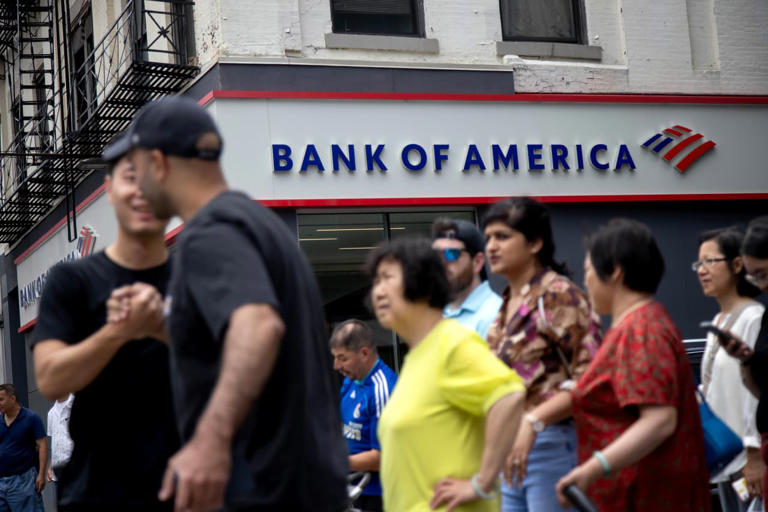The recent revelation by Berkshire Hathaway that it has sold approximately $1.5 billion worth of Bank of America stock is a noteworthy development for investors and market watchers alike. This transaction marks the first reduction in Berkshire’s Bank of America holdings in at least four years, and it has ignited speculation about whether this move signifies a minor adjustment or the beginning of a more substantial divestment strategy.
Historically, when Berkshire Hathaway has initiated sales of major equity positions, it often leads to continued reductions. This pattern has been observed with its previous sizable stakes in U.S. Bancorp, Wells Fargo, Bank of New York Mellon, and HP Inc. In each case, Berkshire Hathaway’s initial sale was followed by further cuts, eventually leading to the complete elimination of those positions. The company’s strategy of systematically reducing large holdings has been a consistent feature of its investment approach, suggesting that the recent sale could be the first step in a more extensive divestment from Bank of America.
Moreover, Berkshire Hathaway has previously exited other significant bank investments, including Goldman Sachs and JPMorgan Chase, since 2020. This broader context indicates that the sale of Bank of America stock might be part of a larger trend of reducing exposure to the banking sector. The market response to such moves often reflects concerns about potential future sales, which can depress stock prices and affect investor sentiment.
The immediate market reaction to Berkshire Hathaway’s sale is evident in Bank of America’s stock performance. On Monday morning, the stock was down 0.7% to $42.60, underperforming compared to its peers. This decline might be attributed to the signal sent by Berkshire’s sale, suggesting that the company’s leadership, particularly CEO Warren Buffett, might view Bank of America’s stock as fully valued or that they are strategically repositioning their investment portfolio. The sale has reduced Berkshire’s stake in Bank of America to approximately 999 million shares, representing about 12.8% of the company’s total shares. Despite this reduction, Berkshire remains the largest shareholder by a significant margin, with its stake valued at over $42 billion.
The timing of this sale is also notable. Bank of America’s stock recently hit a 52-week high of $44, suggesting that Buffett might be taking advantage of the stock’s peak performance to realize substantial gains. This move aligns with Buffett’s well-known investment strategy of capitalizing on favorable stock prices. Given that Bank of America’s stock has appreciated around 25% this year, the sale could be part of a broader strategy to lock in profits and rebalance Berkshire’s investment portfolio.
Another strategic consideration is whether Berkshire Hathaway aims to reduce its Bank of America stake below the 10% threshold. Maintaining a stake above 10% requires more rigorous regulatory disclosure, including reporting any purchases or sales to the Securities and Exchange Commission (SEC) within two business days. By reducing its stake to below 10%, Berkshire could simplify its regulatory obligations and avoid the need for frequent disclosures, which might be an attractive proposition for the company.
Buffett’s cautious approach to equities over the past year is also relevant. Berkshire Hathaway was a net seller of around $24 billion in equities in 2023, with a significant portion of these sales occurring in the first quarter, including about $16 billion in stock sales, predominantly involving Apple shares. This reduction in equity holdings reflects a more conservative investment stance, consistent with broader market uncertainties and Buffett’s prudent approach to managing the company’s $400 billion investment portfolio.
Currently, Berkshire Hathaway’s average cost for Bank of America stock is around $14 per share. The company acquired a substantial portion of its Bank of America holdings through warrants associated with a $5 billion preferred-stock investment made more than a decade ago. Given the significant gains from this investment, the decision to sell a portion of its Bank of America stake may be part of a strategic effort to optimize the portfolio and manage investment risks.
Despite some challenges, including a large paper loss from mortgage securities investments, Bank of America’s recent performance and outlook have been relatively positive. Analysts like Mike Mayo from Wells Fargo have responded favorably to the bank’s recent second-quarter profit report, adjusting their earnings estimates upward and highlighting a robust outlook for net interest income.
As the market absorbs the implications of Berkshire Hathaway’s sale, all eyes will be on whether this move is a standalone event or indicative of a broader shift in the company’s investment strategy. Investors and analysts will closely monitor any further actions by Berkshire Hathaway regarding its Bank of America holdings, seeking to understand whether the recent sale is the start of a more extensive divestment or a strategic adjustment in response to current market conditions.
